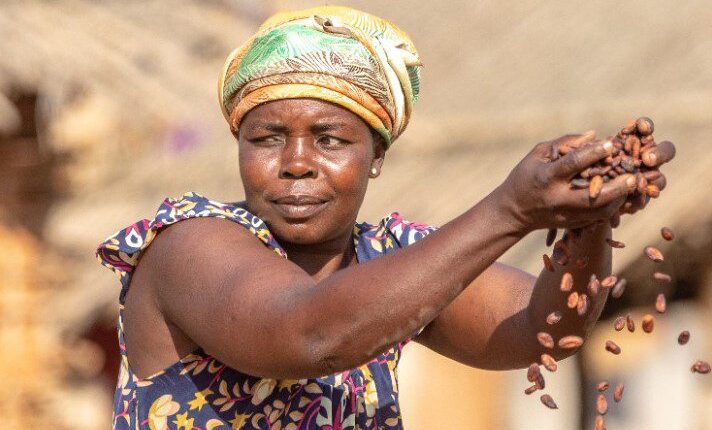Cocoa Barometer: Without Higher Cocoa Prices Sustainability Is A Pipe Dream
Findings of the 2022 Cocoa Barometer report show that pursuing human rights and environmental protection to address cocoa sustainability without paying higher prices will fail.
Chocolate manufacturers and industry have over the years favoured the former, sinking millions of dollars in investments in sustainability programming to boost yields in the hope of tackling worsening farmer poverty.
The European Union, earlier this week, also agreed a new mandatory law that backs industry’s position with a ban on cocoa, chocolate and other commodities and products linked to deforestation.
Higher cocoa price key to sustainability
But the Cocoa Barometer report published by the VOICE Network, a group of civil society organisations and NGOs in the cocoa sector, sees no solution in this direction.
The report shows that “the favoured approaches so far to raising farmer poverty are not going to bridge the income gap”, stating “higher yields do not necessarily lead to increased net income but do lead to greater risks for farmers.”
According to the report, “Without significantly higher farm gate prices, sustainability in the cocoa sector is a pipe dream.”
Living Income is a human right
Higher prices for cocoa on the international market and at the farm gate are believed to deliver living income for farmers, a sustainability pillar that the report argues is a human right.
“Living Income is a human right in and of itself, and also the necessary precondition for all the other challenges in the cocoa sector; farmer poverty is a driver of issues such as deforestation, child labour, and gender inequality.”
The VOICE Network notes in the Cocoa Barometer report that it welcomes supply chain legislation in consuming countries as a positive development if implementation will lead to the desired outcomes.
“The sector change that is needed cannot just come through better farming; a key approach needs to look at the enabling environment of the cocoa sector.
Systemic changes and improvements are necessary in governance policies and in purchasing practices. Only when these are in place is there a business case for thriving farmers,” authors of the report said.
Consumers’ role in effecting change
The Managing Director of the Voice Network, Antonie Fountain, believes consumers are pivotal in effecting the change desired by all stakeholders.
“I think to the consumers .. demand chocolate that has actually paid a fair price to cocoa farmers. Now, what chocolate that is, is a lot harder to find. I think that there’s a lot of misinformation and a lot of very nice marketing that goes into this conversation,” ConfectioneryNews quoted him.
Fountain recommended, “We need to stop talking about our programmes and we need to start talking about our purchasing. It’s as simple as that and there’s a very big message to the governments as well. We need strong regulation in consuming countries, but we need a lot more transparency as well as investment in infrastructure in the producer countries.”
Weighing in on the Cocoa Barometer report, the Executive Secretary of the Cote d’Ivoire-Ghana Cocoa Initiative, Alex Assanvo, agrees, while welcome, the sustainability programmes are not driving the right impact.
He believes coverage is still very limited, while at the same time companies have kept their buying practices business as usual so buying cheap cocoa and leveraging the price volatility to their advantage.
Assanvo observed that despite the good efforts, too many farmers are still living below the poverty line.
“The recent global economic crisis has worsened this situation. Production costs of the commodities we produce for the EU market have skyrocketed. But the price of the commodities we sell has not risen accordingly. Paradoxically, we are being paid less than ever,” he regretted.
The New Standard
He reiterated, “We want to tackle deforestation, but we cannot do this when we receive so little for what we sell. Sustainability has three intertwined and indivisible pillars: environmental, economic and social.”
He insisted however that the economic pillar which relates to pricing and a living income for commodity producers is often ignored.
“We need to move into a new era for the cocoa sector. Where the commodity fundamentals are aligned with sustainability fundamentals and where the true cost of sustainable cocoa is featured into pricing so that farmers get the right reward and incentive to deliver on higher sustainability requirements. The new standard,” Assanvo advocated.
- Illegal Mining Threatening Ghana’s $230M Cocoa Rehabilitation - April 10, 2024
- Ghana Raises Cocoa Farmgate Price by 58.26% to GHC2,070 per bag - April 5, 2024
- New Standard for Measuring Cocoa Household Income Launched - April 5, 2024
